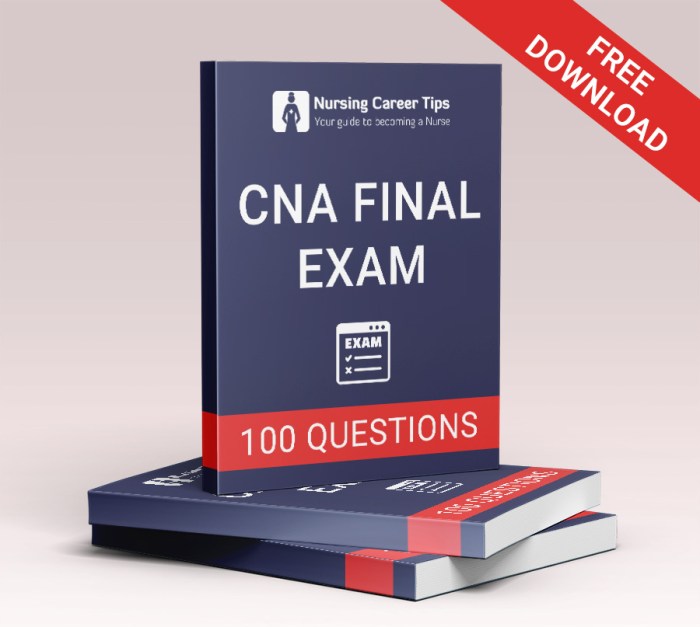Emt final exam 100 questions – Prepare for the EMT final exam with confidence with our comprehensive guide to the 100 questions you’ll face. This in-depth analysis covers everything you need to know about the exam structure, content coverage, difficulty level, preparation strategies, and scoring system.
Our expert insights and practical tips will empower you to tackle the exam head-on and achieve your desired score. So, buckle up and let’s dive into the world of EMT final exam preparation!
Exam Structure

The exam will consist of 100 questions, which must be completed within a time limit of 120 minutes. The questions will cover a range of topics related to emergency medical services, including patient assessment, treatment, and transportation.
Question Types
The exam will include a variety of question types, including multiple choice, true/false, and short answer questions. Multiple choice questions will have four answer choices, with only one correct answer. True/false questions will require you to indicate whether a statement is true or false.
The EMT final exam is a comprehensive test that covers a wide range of topics, including the Iliad, Odyssey, and Aeneid . These epic poems provide valuable insights into ancient history, culture, and mythology. By studying these works, EMTs can gain a deeper understanding of the human condition and the challenges that we face.
Short answer questions will require you to provide a brief written response.
Content Coverage
The EMT final exam covers a comprehensive range of topics essential for providing emergency medical care. These topics encompass the fundamental principles and skills required to assess, manage, and transport patients in life-threatening situations.
The exam’s content is organized into several main topics, each focusing on a specific aspect of emergency medical care. These topics include:
Patient Assessment
- Primary and secondary assessment techniques
- Vital signs and their interpretation
- Head-to-toe physical examination
- Glasgow Coma Scale (GCS) and other neurological assessments
Medical Emergencies
- Cardiovascular emergencies (e.g., heart attack, stroke)
- Respiratory emergencies (e.g., asthma, COPD)
- Neurological emergencies (e.g., seizures, stroke)
- Endocrine emergencies (e.g., diabetic ketoacidosis, hypoglycemia)
- Environmental emergencies (e.g., heatstroke, hypothermia)
Trauma Emergencies
- Mechanism of injury assessment
- Spinal cord injuries
- Head injuries
- Chest injuries
- Abdominal injuries
Pharmacology
- Drug classifications and actions
- Medication administration routes and techniques
- Emergency medications (e.g., epinephrine, naloxone)
Advanced Airway Management
- Indications and contraindications for advanced airway management
- Bag-valve-mask (BVM) ventilation
- Oropharyngeal and nasopharyngeal airways
- Endotracheal intubation
Patient Transport
- Principles of safe and effective patient transport
- Types of transport vehicles and equipment
- Communication with receiving facilities
Difficulty Level
The EMT Final Exam is designed to assess candidates’ knowledge and skills comprehensively. It features a mix of difficulty levels to cater to varying levels of preparedness.
The distribution of questions is as follows:
- Easy (20%): These questions cover basic concepts and fundamental principles, providing a solid foundation for the exam.
- Medium (60%): The majority of the exam consists of medium-difficulty questions that test candidates’ understanding of core EMT skills and knowledge.
- Difficult (20%): A select number of challenging questions are included to assess candidates’ mastery of complex topics and their ability to apply critical thinking.
Overall, the exam requires a thorough understanding of EMT principles, protocols, and procedures. Candidates must possess a strong foundation in medical terminology, anatomy, physiology, and patient assessment to perform well.
Preparation Strategies
Preparation is crucial for success in your EMT final exam. Implement effective study methods and time management strategies to optimize your performance.
Review the course material thoroughly, focusing on key concepts and practice questions. Utilize study groups or online forums to clarify doubts and reinforce understanding.
Time Management, Emt final exam 100 questions
Time management is essential during the exam. Allocate time wisely for each question based on its difficulty. Don’t dwell on challenging questions; flag them for later review.
Handling Challenging Questions
Approach challenging questions strategically. Read the question carefully, identify key terms, and eliminate irrelevant information. Use the process of elimination to narrow down your choices.
If you’re unsure about a question, don’t guess blindly. Use the information provided in the question to make an educated guess.
Scoring System
The exam uses a standard scoring system to evaluate your performance. Each question carries a specific number of points, and the total score you achieve will determine your grade.The passing score for the exam is 70%. This means that you must correctly answer at least 70% of the questions to pass.
The grading scale is as follows:
- 90-100%: Excellent
- 80-89%: Good
- 70-79%: Pass
- Below 70%: Fail
Partial credit may be awarded for questions that are partially correct. The amount of partial credit awarded will depend on the extent to which your answer demonstrates your understanding of the material.
Quick FAQs: Emt Final Exam 100 Questions
How many questions are on the EMT final exam?
100
What is the time limit for the exam?
Typically 2 hours
What types of questions are included on the exam?
Multiple choice, true/false, and scenario-based